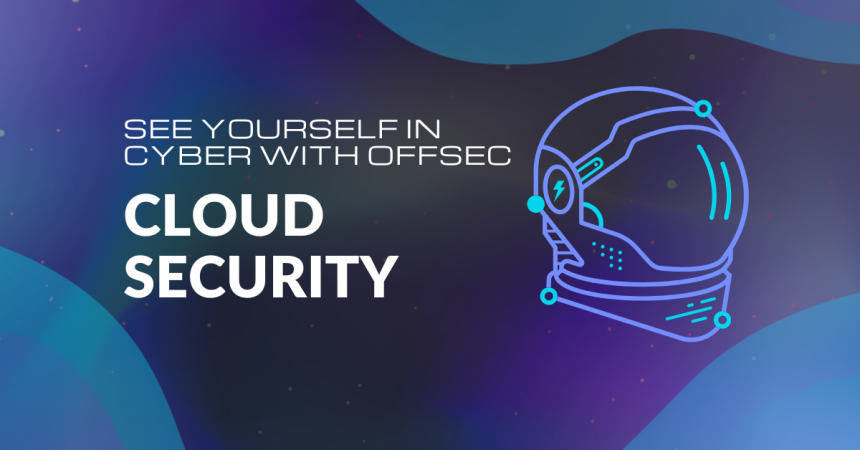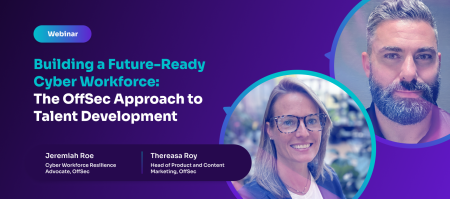Blog
Oct 31, 2022
See Yourself in Cyber with OffSec: Cloud Security
As part of Cybersecurity Awareness Month 2022, we share out insights on starting a career in cloud security, together with key skills, prerequisites, career outlook, and much more.
7 min read

As the number of organizations adopting remote or hybrid work models grows, so do cloud-based applications. Migrating to the cloud allowed organizations to support their employees regardless of their location and has brought increased efficiency, convenience, and other important opportunities. However, this cloud reliance also introduced cyber threats.
Organizations are investing heavily in cloud security procedures and technologies to address threats. A focus on cloud security is important to drive their digital transformation efforts forward and move to the cloud.
Cloud security is one of the fastest-growing fields of cybersecurity. A cloud security engineer’s job is to provide security for cloud-based infrastructures and plays a key role in protecting an organization’s critical systems. If you have an interest in this career path, we’re highlighting some of the key skills, prerequisites, training options, and more:
Why choose a job in cloud security?
As mentioned, cloud security is one of the fastest-growing fields in the industry. As of 2022, statistics show that 60% of all corporate data is stored in the cloud. With this being the case, a big majority of organizations rely on the cloud to store their critical data. As cloud adoption is expected to grow, organizations will continue to have great parts of their critical infrastructure in the cloud. This means that security professionals who specialize in cloud technologies will be in extremely high-demand across businesses of all sizes and industries.
Not only is cloud security talent in great demand, but the demand also surpasses the supply, with (ISC)2’s 2021 Cloud Security Report showing that 39% of respondents report lack of talent as a major barrier to faster adoption of cloud services. This makes cloud security a well-paid career path too. The average base salary for a Cloud Engineer with 2-4 years of experience sits at $141,511 per year.
As a result of this environment, cloud security is a great option for security professionals that want to advance their careers while working with technology that enables the operations of many of today’s organizations.
A career in cloud security is also an exciting prospect. With a wide number of threats targeting cloud services– from misconfigurations and insecure APIs to DDoS attacks and data loss, cloud security professionals always have new challenges to overcome.
Cloud security engineer tasks and responsibilities
Organizations use different public cloud technologies from various vendors. While the cloud provider provides a baseline of security controls for their platform, organizations are responsible for securing data and other assets they store in the cloud. This is where the role of cloud security engineer comes in. But this is just one facet of a cloud security engineer’s tasks and responsibilities.
A cloud security engineer helps organizations design and implement secure workloads and cloud infrastructure. Following security best practices and industry requirements, they design, develop, secure, and maintain cloud-based applications and cloud infrastructures. A cloud security engineer’s specific roles and responsibilities depend on their cloud security journey and the stage of their career.
Cloud security engineers typically work in organizations that use cloud-based systems and applications for cloud service providers or consultancies and managed security service providers (MSSP). They may also work for cloud service providers or consultancies that specialize in cloud security.
Generally, there are three major roles a cloud security engineer would advance through their career:
-
- Junior-level Cloud Security Engineer: While not a junior role in information security overall, as it still requires substantial industry knowledge and experience, junior cloud security engineers are tasked with responding to alerts across cloud providers.
- Senior Cloud Security Engineer: As the next step in the career path, senior cloud security engineers design, build, deploy and tune cloud security tools to monitor networks, endpoints, and cloud workloads.
- Lead Cloud Security Engineer: As a high-level role, lead cloud security engineers identify gaps in solutions and drive the direction of the cloud security team.
Overall, some of the key responsibilities and tasks you will be performing throughout your cloud security career are:
-
- Developing, upgrading, and maintaining an organization’s cloud infrastructure
- Cloud penetration testing to uncover misconfigurations and vulnerabilities
- Monitoring, identifying, and responding to risks and threats to the cloud infrastructure
- Configuring access and implementing identity and access management processes in the cloud infrastructure
- Managing cryptography and encryption in the cloud
- Managing operations within the cloud environment
- Determining technological needs and suggesting solutions that meet them
- Working with security and development teams to improve the delivery of secure cloud deployments
- Designing and developing infrastructure automation capabilities
- Keeping up with trends and advancements in cloud security and making recommendations to continuously improve an organization’s cloud security posture
- Evaluating application and their viability to be migrated to the cloud
- Spearheading initiatives on implementing new cloud security technologies and practices
- Ultimately, ensuring regulatory compliance and data protection.
Key skills and requirements for a career in cloud security
A career in cloud security allows you to use your skills and talents in an exciting, rapidly-growing field. You will be facing a wide range of the latest threats and a constantly changing landscape, so you need to be able to work quickly and efficiently to come up with solutions to address these challenges.
As a complex field, cloud security can’t be your first job. It expands across almost every domain in information security, and being a cloud security engineer requires experience in several areas. Generally, employers look for candidates who have 3 to 5 years of experience in information security.
Starting a career in cloud security needs to involve learning and experience that is a mix of vendor-specific and vendor-neutral concepts. For vendor-specific, it usually involves experience working and configuring platforms such as Azure, Amazon Web Service (AWS), or Google Cloud Platform (GCP). Choosing a vendor to start learning will mostly depend on the type of provider you work with the most at your job. When it comes to vendor-neutral concepts, they include the main frameworks, practices, and technologies in cloud security and information security in general.
While wide and complex, when you are just starting in cloud security, these are some key skills, processes, and prerequisites:
Experience with information security and cloud computing concepts
As mentioned, cloud security will never be your first job in cybersecurity. You will need extensive knowledge and experience with IT and information security fundamentals such as operating systems, networking, network security, data encryption, cryptography, authentication/authorization protocols, and web application security. In order to uncover vulnerabilities and misconfiguration in a cloud environment, cloud security engineers also need to be able to perform penetration testing and application security assessments.
A good first step towards starting training in cloud security would be taking up training in IT and infosec fundamentals. CLD-100 is OffSec’s first cloud security training offered through our Learn subscription training plans. In CLD-100, you will be able to brush up on key technical concepts and skills, as well as cloud security-specific knowledge that is vendor-neutral. This makes it the perfect starting point as the skill and knowledge from CLD-100 can be applied to any cloud vendor and set you up for success in further training in cloud security.
Tooling and technologies
Cloud security is a tool-intensive job. As it covers so many domains of cybersecurity, it uses many different tools and technologies to provide maximum security to an organization’s cloud infrastructure. Some of the types of tools and technologies that are used in cloud security include:
-
- State enforcement
- Source Control
- Logging and alerting
- Secrets management
- Containerization
- Runtime security engine
- Inventory Management
- Encryption
Fluency in programming languages
Considering you will be working with apps and looking for security vulnerabilities, coding knowledge is important for a cloud security engineer in order to find those missed by automated tools. Additionally, as organizations strive towards secure cloud development, cloud security engineers should be familiar with coding. They will work on evaluating and implementing procedures to ensure a secure app development cycle, so knowing about these principles is important. Some key learning languages include Python, Shell, C++, C#, JavaScript, and SQL.
Database management
While leading cloud providers offer an assortment of cloud storage options, databases remain the most common choice in today’s organizations. Databases are updated frequently, so it’s important for them to have strong security controls. Understanding the different database types and how they work is a critical skill set for aspiring cloud security engineers.
Strong analytical and troubleshooting skills
Analytical skills are important in all infosec domains, but it’s even more important in a fast-evolving field like cloud security. As a cloud security engineer, you will be analyzing data and information, finding patterns and trends, and coming to logical conclusions and solutions to challenges that come your way.
Cloud security careers are among the most prominent roles available to any cybersecurity professional in the coming years. As more organizations become increasingly dependent on these platforms, there will be a growing need for skilled and experienced personnel to ensure these critical systems are safe. Choosing a career in cloud security can set you up for a long and successful career as the field continues to grow. If you are interested in pursing prerequisites for starting to train in cloud security, check out our Learn subscriptions.

Sara Jelen
Sara Jelen is the Content Marketing Manager at OffSec. Through her extensive work as a writer and content marketer, Sara is specialized in the cybersecurity domain. With a background in anthropology and arts, Sara incorporates a human-centric perspective in exploring cybersecurity topics and the movers and shakers behind it.
Cybersecurity leader resources
Sign up for the Secure Leader and get the latest info on industry trends, resources and best practices for security leaders every other week
Latest from OffSec

Enterprise Security
Red Team vs Blue Team in Cybersecurity
Learn what a red team and blue team in cybersecurity are, pros and cons of both, as well as how they work together.
Dec 13, 2024
13 min read

Enterprise Security
Building a Future-Ready Cybersecurity Workforce: The OffSec Approach to Talent Development
Learn all about our recent webinar “Building a Future-Ready Cyber Workforce: The OffSec Approach to Talent Development”.
Dec 13, 2024
4 min read

Enterprise Security
How to Become the Company Top Cyber Talent Wants to Join
Become the company cybersecurity talent wants to join. Learn how to attract, assess, and retain experts with strategies that set you apart.
Dec 4, 2024
5 min read